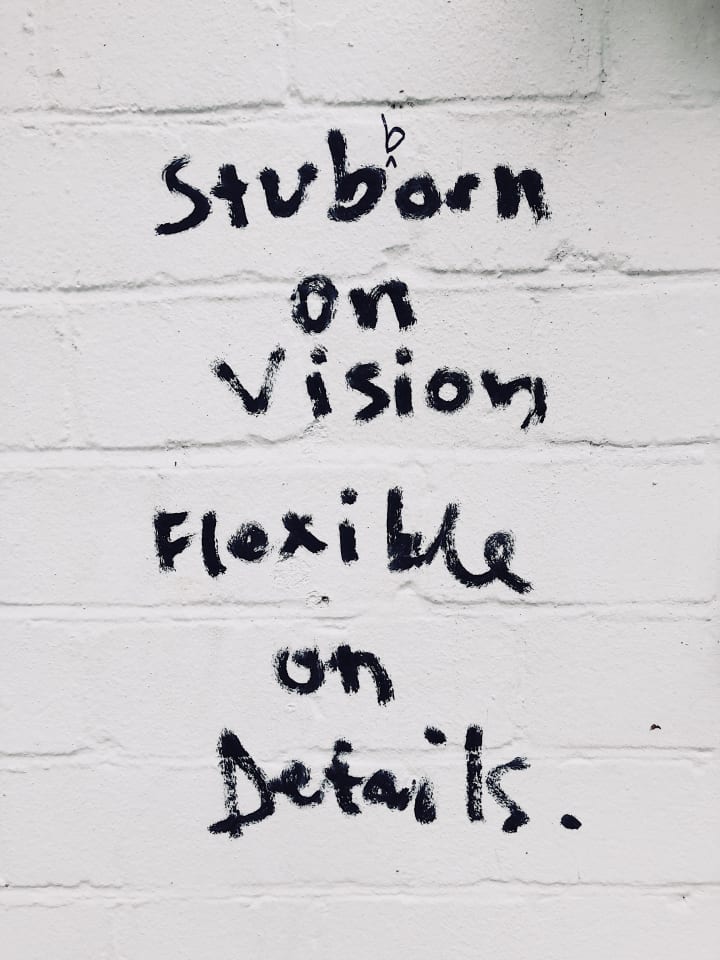Work As A Mere Facet of One's Personhood and Life Purpose
On Striking the Balance In All Aspects of Life and Living

Work. Making a living. Career. Finance. Wants and needs. In the average American mind at the very least, this is thought about 24/7. Such buzzwords enter our minds without fail and get us caught up in a frenzy of endlessly, well, working (sometimes multiple jobs) towards a reward of some kind - chiefly money.
It doesn't help when life is always costing us more with what seems like each passing moment. Inflation alone drives people either to paralysis in our financial anxiety or an overcorrection of working non-stop until the problems are resolved. It's a decidedly vicious cycle I doubt any of us want to be a part of and would like a better way to live instead.

The real question is how to go about breaking free without losing one's mind in the process. By losing one's mind, I mean getting further into the cycle through joining hustle culture and falling into the trap of money-making schemes, all for the sake of bringing in enough income to feel better about one's finances.
Basically, this article is all about rethinking work and putting it as well as money in general back in its proper place in one's life. This is about bringing back sanity and living again without getting caught in this sort of trap. (I speak from experience as someone working multiple full-time and essentially full-time jobs to make ends meet, so this is just as much for me as it is for you. Trust me; I know the struggle all too well.)

I. See the value of hard work, deep work, smart work, and life's work.
You may be at least somewhat familiar with the terms listed above. Hard work is defined as work that is difficult to do and/or is mundane and tedious, and more so pertains to the daily workload where one is progressing towards a goal. In school, the hard work was learning the coursework in general, for example. In a day-to-day job, the hard work is the tasks commonly found within the job itself, such as getting through the office work, flipping the burgers at a fast enough rate, or perhaps working the lines in a factory. It's more of an umbrella term than anything else, falling just beneath the original umbrella term of work in general.
Deep work means engaging and grappling with the sort of work that could change the world, in a nutshell. This is work meant for the creatives, deep thinkers, engineers, movers, and shakers that may not always be famous, but definitely help make the world a better place. It is not at all easy to replicate and is not meant for just anyone to do. This sort of work also doesn't generally pay immediately for the one employed but has a much bigger payout, in the end, making it a worthy investment.
Smart work pertains to how a job is done, which ideally is as efficiently and effectively as possible. Doing things a smarter way takes invention, and if higher-ups are open to the suggestions for how work can be done better, could potentially lead to greater rewards in the workplace.

Now, why is it so important to see the value in these three types of work? It helps us to understand where these types of work fall in the hierarchy of work itself. You have the hard work that is an umbrella term which most people are required to do every day in some facet, usually as simply part of the labor force. Then you have those who are ascended to higher ranks and are doing much more difficult work in their daily lives, which forces them to think differently than other workers. Finally, you have those who are part of either of those work styles who also engage in working smart.
Deep work ranks the highest due to difficulty while hard work is low ranking. Smart work is more about how someone does their job, so it doesn't get a ranking per se. Understanding these types of work brings an appreciation for work itself, which is still important when it comes to seeing work as only a facet of one's self and life.
This is so we don't overcorrect in the other direction and start seeing work in general as unimportant. It is highly important that we as a society continue working in one facet or another, as this brings stability not just in our personal lives, but in our collective world. Work is and has always been an integral part of the fabric of society. This will not change no matter how many government handouts are given to those who refuse to work.
Why does work have value, to begin with? It gives us a reason to get out of bed in the morning. It gives us purpose and something to do. It often provides us with goals to improve ourselves and our lives, as well as the lives of those we care about. Depending on the sort of work one does, the work itself may be considered a fourth type of work - life's work.
Life's work is often regarded as an ultimate type of work that gives us the reason to work in general. Perhaps we are developing a business meant to make our communities better and bring people into a better state of being. Perhaps some of us are writing a masterful piece of literature that will speak truth to its readers. Some of us may have work to do that involves telling, preaching, or teaching the ultimate Truth - the Gospel message of Christ Jesus. This is the kind of work that makes life worth living and gives value to work in general.
II. We must also value having a life to live.

However, in an effort to get back to the main point, work is still only a facet of one's life and personhood. It's still not everything to us as a people. We must learn to view work in a proper light.
Work is important without a doubt, seeing as how this is by far the only true way to get what we need and want in this life. However, we should keep work in its proper place by learning to enjoy life as it happens.
In an effort to avoid workaholism and keep our sanity, we must recognize that we are human, and no matter what monetary or physical items are needed or wanted in a given moment, and no matter what debts we may carry in this moment, we have to acknowledge our need for rest and enjoyment. What good is it to always be working and to never give one's self a break, even when we are at our, pun intended, breaking point?
It works kind of like this: in much the same way we cannot appreciate what is good without first knowing what is bad, or darkness and light, we cannot appreciate rest without first appreciating work, and vice versa. The two operate in a duality of sorts or opposite sides of the same coin. The reason for this is so we learn and appreciate the differences between the two and seek a good life balance between these important parts of life.
If you find yourself in a situation where you are working a lot of hours and taking less and less time for yourself to recharge, you may need to start stepping away for a while from your work. You've more than earned a break if that's been your life as of late.
III. Recognize that you are more than just what you do for a living, or even what you consider your life's work.

We human beings are, and have always been, so much more than what we do for a living. We're multifaceted like diamonds or other precious gems. We have different aspects of our lives going on each and every day. Our job is not our entire being. Even our life's work is not absolutely everything to us, though it does take up much of our mind and our time.
Think about it; every human being that is seeking growth and change in their lives is always in just that - a state of growth and change. When given new and solid information, our very opinions and beliefs are subject to change; and rightfully so, for it is impossible for us to know everything right off the bat and all at once.
We may also get hit with situations and circumstances that change the course of our lives, whether for better or for worse. If you limit your entire being to what you do for a living, and you lose your ability to somehow do that, it could either mean a point of devastation or a point of reinvention for yourself. Also, if you view your work as the entirety of yourself, then you will lose the balance between work and rest, feeling as though if you're not constantly working, then you are somehow not who you claim to be.
Therefore, it is for the best that we view work in its proper light as a mere facet of ourselves. This will allow us to mentally give ourselves the right to rest when we need it and to build other points of our lives rather than just the work aspect.
IV. This is going to take a lot of rethinking in our own minds about life and work.

Now, I know for a fact from my own life that this is not an easy task. I deal with troubles of my own every day that try to turn me back into a workaholic. I have to do this work as well to rebalance and recalibrate my mind so that I don't fall into this trap once again.
I have had jobs give me issues with my paychecks a few times in the past where I've for whatever reason only been given half my pay even though I had put in a lot of overtime. I've been out of work for months at a time and have been considered a burden on my family as a result - things that echo in my mind to this day. I've had mounting debts causing me great financial anxiety to the point where I feel guilty for taking time to eat, sleep, shower, or get out for a bit. All of this has given me a spirit of fear when it comes to finances, and that has had me thrown off kilter for a long time. Since college, actually…and I know for a fact I'm not the only one with these sorts of struggles.
That is why I chose to write this particular post - to help people who are in a similar situation for whatever reasons that got them there.Having a spirit of fear over anything in life is not a sustainable way to live, and this is especially true when it comes to work and finances. We're just not built to continually have such burdens on our minds day and night. We have to allow ourselves the gifts of rest and balance in our lives. There is a time and place for work just as there is a time and place for rest.
V. Find Ways to Reset Your Mind About Work

So how do we begin resetting our minds in such a way that work is put back to being a facet and not everything to ourselves? Well, the long and short of it is that it will look different for everyone depending on their circumstances. Some people set a schedule for themselves that has them devoting time to their work, but allowing time to take a walk to rethink things.
In deep work, for example, many authors and scientists put in place a good amount of time to walk to their secluded areas of work, be it a cabin in the woods on their property, or an office just outside of town. But they include a reasonable amount of time to walk, which gives them a chance to think and often develop big ideas for the next great classical work or world-changing invention. This has proven itself to be exceedingly helpful, as the body is made for motion, and often when the body is in motion, so is the mind. The motion of walking in nature on a favorite trail, for example, allows the mind to work through the anxiety through the physical action itself, and creates both a feeling of accomplishment and getting on a roll with the day.
Other methods include setting a schedule and routine that you'll stick to in an effort to actually accomplish tasks throughout the day, which will produce more peace and less anxiety. When doing this, remember that you're human, and budget your time accordingly. As the old adage goes, "Rome wasn't built in a day". Allow time to peacefully drink your favorite beverage, listen to soft music or a favorite podcast, and do whatever you need to do to give your mind and body that rest it needs. Perhaps it means that every so often you schedule for yourself a day or two off work just to get your mind off of it for a while, and work on what it is you want to do. It could also mean you focus on waking up earlier each morning so that you have an hour or so to journal or read, that way you're not forcing yourself to hit the ground running upon waking up each day.
A third option is to take part of the money you do earn each pay period and investing it so that it grows on its own. Having money in accounts that grow on their own steadily may go a long way towards feeling you can relax and not have to work so hard.
Whatever the case may be, the point in all this is to recognize that work has to be placed properly in our lives so it doesn't completely overtake every detail and waking moment. It is important, but is also only meant as a facet of our lives and selves. It's not meant to be everything to us, body, mind, and soul. I encourage everyone who reads this post to think about how we view work each day, and to seek a better way to live especially if it is in any way driven by fear of financial failure. Don't allow such fears to drive you to workaholism and, therefore, an eventual mental breakdown.
You're not alone in this, as I'll be working on this for myself as well. Stay sane out there, friends, and thanks for reading.
About the Creator
Jackie Barrows
Jackie Barrows is an artist, a writer, and all around creative soul who enjoys bringing new ideas and stories to life. She wears many hats as a Graphic Designer, a blogger, and Lead Production Artist for R.A.W. Productions.






Comments
There are no comments for this story
Be the first to respond and start the conversation.